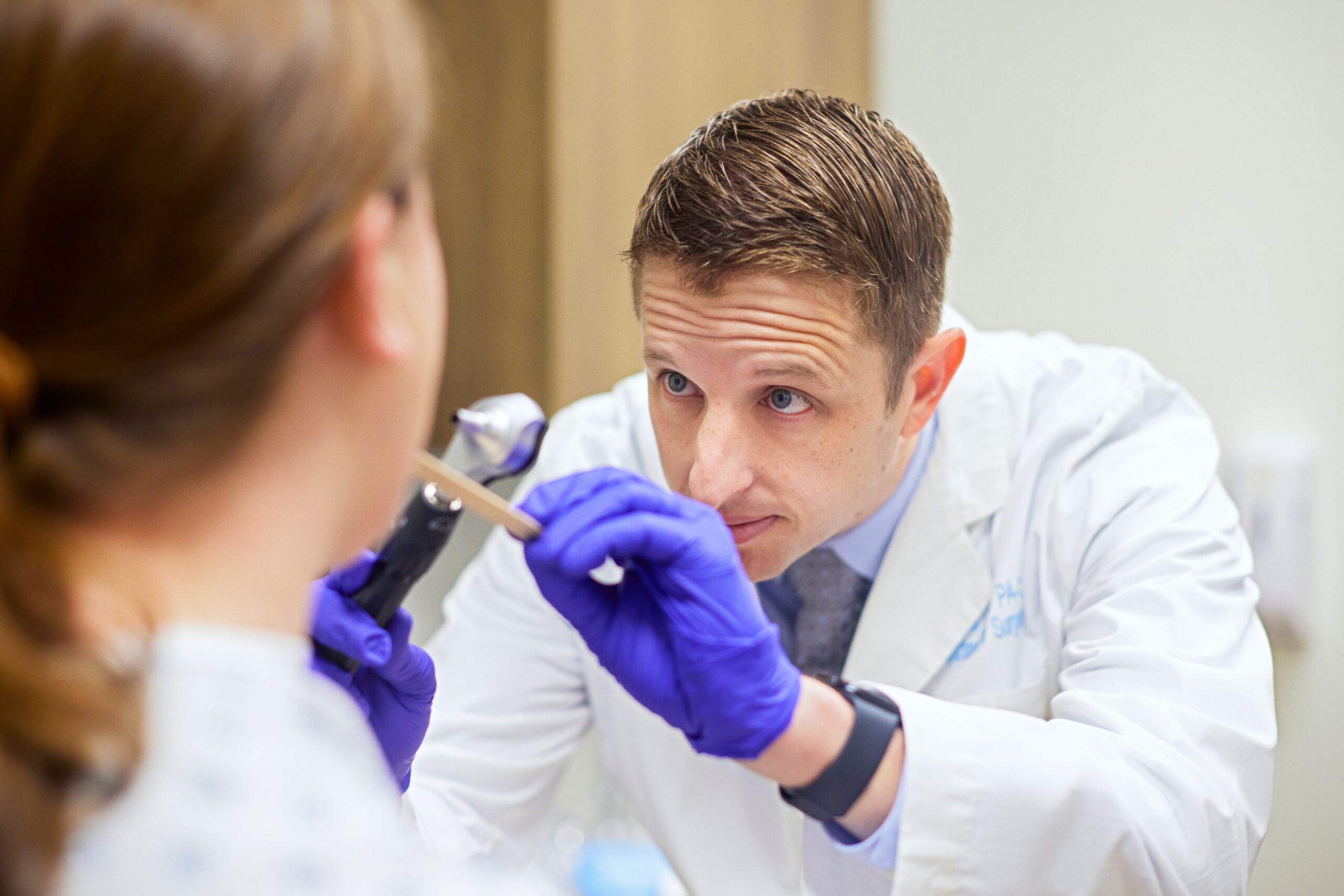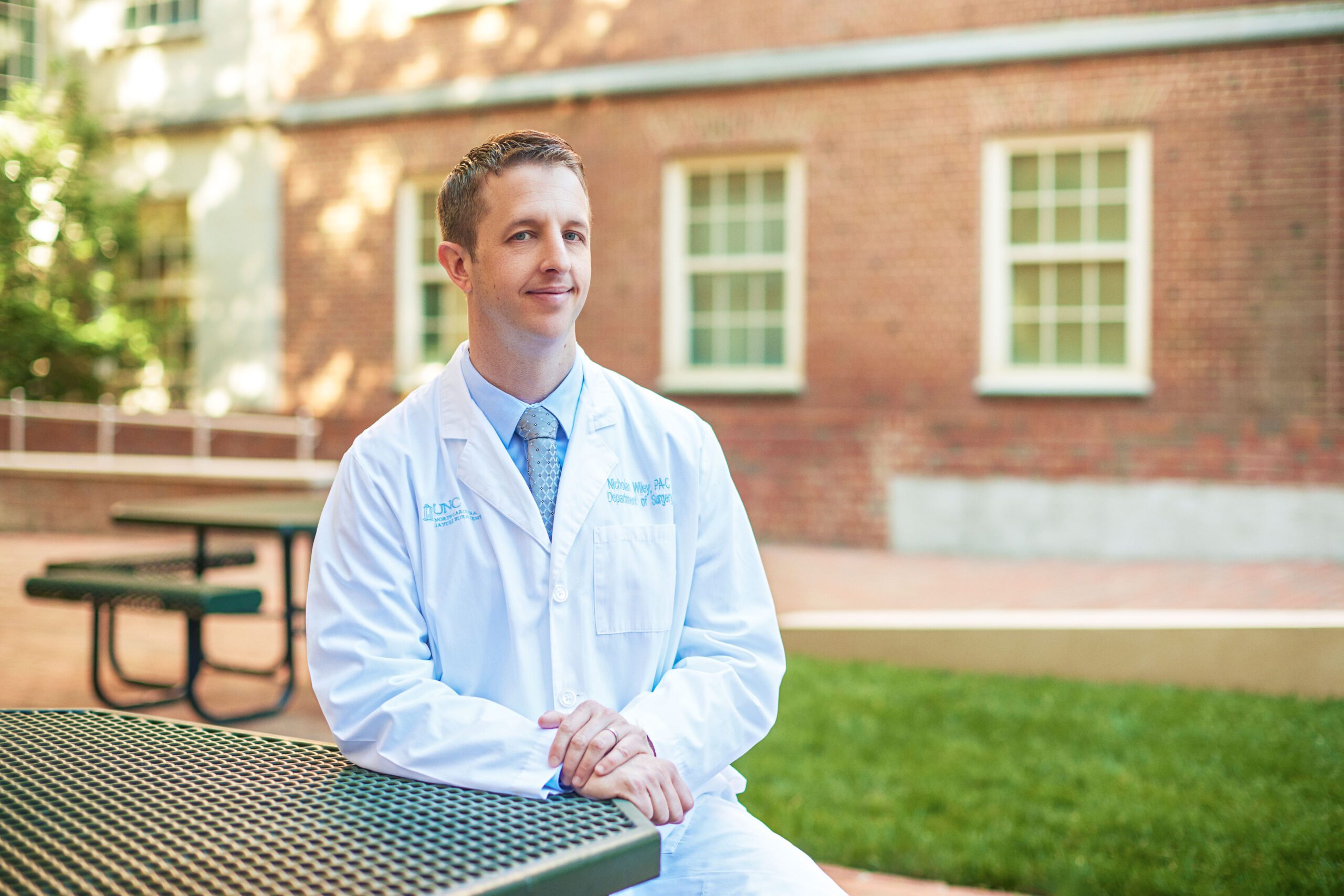A visionary partnership between Blue Cross and Blue Shield of North Carolina (Blue Cross NC) and UNC School of Medicine is providing veterans with the medical training they need to carry out a new mission – improving the health of North Carolina.
Picture two health care providers, each on opposite sides of the world. The first in fatigues and combat boots, swiftly administering care under a tent in the desert heat, and the second in a white lab coat and blue shoe covers, laser-focused in a state-of-the-art operating room. Both spend their days fixing broken bones, treating burns, stitching wounds – skillfully trying to undo as much injury as possible for patients and set them forth on a path of healing.
However, when the tour of duty ends for the first health care provider, there is no simple process to turn that extensive health care experience into civilian medical practice back at home. In North Carolina, more than 20,000 active military members transition into civilian life every year. And despite the fact that the state is critically short on health care providers, veteran medics are not able to claim open positions in the health care workforce because the state does not accept military medical credentials.
This is a problem. Luckily, it has proven to be a solvable one, with the right partnerships in place.
Blue Cross NC is committed to addressing provider shortages across all 100 counties through solutions that help coordinate care for patients, partnerships that grow the health care workforce, and on-the-ground community investments that provide targeted support for local issues.
In 2012, the University of North Carolina at Chapel Hill School of Medicine (UNC School of Medicine) and Blue Cross NC worked together to develop a new physician assistant program within the university’s Department of Health Sciences aimed at recruiting non-traditional students such as veterans or N.C. residents over the age of 26. With an initial $1.2 million grant from Blue Cross NC and guidance from the United States Army Special Operations Command at Fort Bragg (now Fort Liberty), the two-year master’s program enrolled its first class of students in 2015. Of the 20 accepted applicants in the inaugural class, almost half were veterans. Nick Wiley was one of them.
Wiley joined the military in 2006 as a Navy Corpsman – a medical position that supports both the U.S. Navy and Marine units over land, air, and sea. During his 10 years of service, he traveled the globe, training with foreign militaries before being stationed with marine units leading reconnaissance missions in Afghanistan. On a good day, he provided basic medical screenings and treated minor, non-life-threatening issues. Then there were the days when soldiers involved in active combat would arrive needing life-saving surgeries and emergency treatments for traumatic injuries from gunfire and explosives. It was in these high-stakes moments that Wiley found his calling in helping patients suffering from burn trauma.
“I feel there is a lot of hesitancy for people to work in this specialty,” he says. “Because the injury itself is so visible, it’s easy for someone to focus on the burn and not the patient. Wound care can be an uncomfortable experience for medical providers. Sometimes it involves placing patients in pain despite our best efforts. People going into medicine want to help others, and, from the outside, wound management can look like you’re doing the opposite.”
Back at home and between deployments, Wiley continued to pursue specialty medical training and in 2013 began serving as an instructor for the Special Operations Combat Medic course at Fort Bragg. During his time there, he had the opportunity to join a clinical rotation at the North Carolina Jaycee Burn Center at the UNC Medical Center (NC Jaycee Burn Center). When Wiley learned about the new physician assistant program for veterans at the UNC School of Medicine, he saw a direct pathway to the career he wanted.
“A lot of programs don’t focus on non-traditional students, but half of my class were veterans or dependent on veterans. So, it was a heavily supportive community and eased the transition,” Wiley says.

The UNC School of Medicine Physician Assistant (UNC PA) program was designed to address two problems with a single strategy: Fill the statewide gap in health care providers and help returning veterans with medical training find careers in civilian health care across North Carolina.
The leaders of the program will also tell you there’s an added bonus that comes with veteran students. It goes beyond their medical experience and need for employment to who they have become because of their service. Their experiences reinforce discipline, resourcefulness, commitment, and compassion. All characteristics that make for an exceptional health care provider.
“In the military, nobody exists by themselves, and that is the same with medicine,” says Katie Hanlon, program director for the UNC PA program. “Veterans inherently understand teamwork. And as PAs, our job is to be team players and to collaborate with physicians. A team-based approach to medicine provides better patient care and patient outcomes.”
Wiley completed the UNC PA program in 2017, and now splits his time teaching the next generation of PAs as an assistant professor at the UNC School of Medicine and working with patients at the NC Jaycee Burn Center.
“It’s an incredible feeling rounding on the floor and seeing people who may have suffered a terrible injury recovering to the point where they could go home and be with their families,” he says.
In 2018, Blue Cross NC invested another $1.2 million into the program, in part to grow the student body and lay the foundation for developing the rural sites needed to accommodate the increased number of students on clinical rotations in their second year of study.
“Blue Cross NC has bolstered the program, which results in more North Carolinians gaining access to health care across the state,” Hanlon explains.
“Simply put, this program is a win-win,” says Cheryl Parquet, Director of Community Engagement at Blue Cross NC. “We’re helping military veterans build upon their valuable training while strengthening the state’s health care workforce. As a partner and champion of the UNC PA program, it’s exciting to see more and more graduates out there in the field, bringing high-quality care to North Carolinians.”

Christan Battle, a veteran currently in the UNC PA program, is in the process of completing her clinical rotations after serving for 20 years in the Air Force. “It’s a big transition when all you know is the military,” she says. “All of that valuable experience doesn’t translate over. You’re basically at square one, so it can be very challenging if you don’t have something lined up.”
Students in the UNC PA program train for careers in everything ranging from primary care to orthopedics, cardiology, emergency care, and mental health. Though graduates can choose to practice wherever they want, the program is designed to create a pipeline of providers for medical deserts across North Carolina.
“There is a national shortage of health care professionals and PAs help to fill it,” Hanlon says. “Our goal is to equip our students with the knowledge and experience to practice in areas with the most need, such as rural and underserved communities.”
Many graduates have answered that call of duty. Battle plans to do the same. “I want to work with rural and underserved populations. I’ve always wanted to give back and I see the need there,” she says.
Since 2015, 140 physician assistants have graduated from the UNC PA program and gone on to careers in ORs, ERs, and clinics. They’ve traded their boots for shoe covers, their camouflage and dress blues for lab coats and scrubs. Because of this unique program and partnership, more veterans can step into civilian life and find purpose waiting for them on the other side.
“When you’re in the military, you have a spot. You know where you are, where you stand,” Wiley says. “When you get out, it’s very easy to feel lost, that you don’t have a purpose. This program gives you a place in society.”

